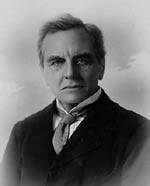William Johnson Sollas
| William Johnson Sollas | |
|---|---|
 |
|
| Born |
30 May 1849 Birmingham |
| Died | 20 October 1936 (aged 87) |
| Nationality | United Kingdom |
| Fields | geology and anthropology |
| Institutions |
University College, Bristol Trinity College, Dublin University of Oxford |
| Alma mater | St John's College, Cambridge |
| Known for | invention of the diffusion column |
| Notable awards |
Bigsby Medal (1893) Wollaston Medal (1907) Royal Medal (1914) |
| Children |
|
William Johnson Sollas FRS (30 May 1849 – 20 October 1936) was a British geologist and anthropologist. After studying at the City of London School, the Royal College of Chemistry and the Royal School of Mines he matriculated to St. John's College, Cambridge, where he was awarded First Class Honours in geology. After some time spent as a University Extension lecturer he became Lecturer in Geology and Zoology at University College, Bristol in 1879, where he stayed until he was offered the post of Professor of Geology at Trinity College, Dublin. In 1897 he was offered the post of Professor of Geology at the University of Oxford, which he accepted.
Considered "one of the last true geological polymaths", Sollas worked in a number of areas including the study of sponges, brachiopods and petrological research, and during his lifetime published 180 papers and wrote three books. His biggest contribution at Oxford was in expanding the University geology department, hiring new Demonstrators and Lecturers and expanding the facilities available to students. Described as "eccentric" in his final years, he left much of the running of the Department to J.A. Douglas while he concentrated on research, finally dying in office on 20 October 1936.
Sollas was born in Birmingham on 30 May 1849 to William Henry Sollas, a ship owner, and his wife Emma Wheatley. He was educated at the City of London School, where he first became interested in chemistry, and from there moved on to the Royal College of Chemistry in 1865, spending two years working with Sir Edward Frankland, and in 1867 gained a scholarship to study at the Royal School of Mines. There he came under the influence of scientists such as Warington Wilkinson Smyth and Thomas Henry Huxley, later saying "I owe [Huxley] more, both morally and intellectually, than to any other I can name". After becoming an Associate of the Royal School of Mines he competed with William Garnett for chemistry scholarships at St. John's College, Cambridge; they were both accepted. At Cambridge Sollas was taught by Thomas George Bonney, who persuaded him to switch to geology, which he did, gaining First Class Honours in the Natural Sciences Tripos in 1873.
...
Wikipedia
